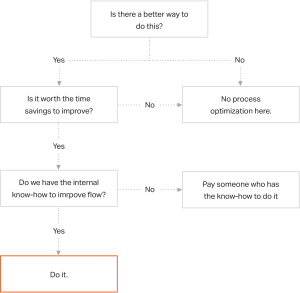In a perfect world you would have an accountant or bookkeeper handle all of your invoicing needs. However, as any freelancer or small business owner will tell, they often don’t have the resources to do this. That’s when you may want to consider entrusting the invoice process to an employee through delegation. Handing over the reigns to an employee lessens the workload on your end so that you can focus on more important tasks. Additionally, this employee may enjoy invoicing or is better suited to invoice. For example, they could more organized or better with crunching numbers. But, before you let someone else handle your invoicing, follow these eight tips for entrusting the invoice process to employees.
1. Hire carefully, based on skills you need.
First things things. You want to think about what you’ll be delegating in the future from day one. And, this means hiring the right people from the get-go.
When it comes to invoicing, look out for people who are detail-oriented, reliable, timely, and are comfortable with accounting.
2. Choose wisely.
Since your employees all have various strengths, that’s why you should learn their strengths and weaknesses. This way you’ll be giving them work that actually plays to their abilities. As a result, they’ll be able to get started right from the start.
So, when it comes to invoicing, you want to only consider those who are organized, proactive, and are good with numbers. If an employee admits that they’re not good with numbers, then you definitely want them to be in charge of your invoicing just because they have the spare time.
Remember, when it comes to delegation, you need to trust your employees. And the best way for that trust to be earned is by knowing that the employee ready to complete the work.
3. Communication is key.
Since you’ve chosen the best employees to handle your invoicing, you now want to express your confidence in them. Besides verbally telling them this, you can also communicate your confidence by giving them 100% control.
Most importantly, you also need to outline the scope of the work. This includes a full description of the task or project, a timeline with milestones, scheduled check-ins, budget, and who they can contact if they need help.
4. Invest upfront in teaching and training.
I completely get it. There are certain tasks that you can do more quickly than showing someone else. Especially when there are invoicing tools that can automate tasks like recurring billing and payment reminders.
However, repeat this iconic training tenet, “I do, we do, you do.” This means your employees watch you perform an invoicing task, you do it together, and then they do it on their own. It may sound tedious, but this will ultimately lead to better results.
Remember, when you have an empowered employee, they’ll reward you with the proper time and skills to be both independent and efficient.
5. Hand over the keys.
Whether you’re inexperienced or a control-freak, some leaders have a difficult time delegating tasks to someone else like entrusting the invoice process to employees. As a result, they frequently check, correct minor errors, and insist that the employee does the task their way.
At the other end of the spectrum, successful leaders empower their employees by stepping away from projects or tasks altogether. In other words, they hand over the keys completely.
If you’re still hesitant, remember that if chosen the right person and communicated expectations clearly, then you should trust that they’ll get the work done.
6. Only step-in occasionally.
Even after you’ve handed over the proverbial keys to invoicing, you should still check-in occasionally. After all, you still have every right to make sure that the invoicing process is running smoothly.
One of the simplest, and most effective, ways to do this is by sending an email every now and then. For example, if you send out monthly invoices, just ask a couple days in advance if everything is on-track and if there are any questions. Just make sure that the email is short, respectful, and encouraging.
7. Create a regular feedback loop.
Even if the employee is doing an incredible job, you still need to build feedback into the delegation process – both yours and theirs. Give them an opportunity to make a few mistakes occasionally so that they can learn from their mistakes until they find their own way. Just make sure that you offer constructive feedback instead of yelling at them.
But, what if they’re an invoicing rock star? Then you did your job in delegating the process to them. Just make sure that you share that success with everyone else – they earned it and we all love feeling appreciated.
8. Acknowledge the person taking over.
Never underestimate the power of saying, “Thank you for taking this on” or “You’re doing a great job.” It’s a powerful way to make the employee feel appreciated, as well as shows that they’ve earned your trust and respect. It can even motivate the team member to keep being an invoice master.
Once you implement these best practices, you should feel confident about entrusting the invoice process to employees.
Business & Finance Articles on Business 2 Community
(17)
Report Post





